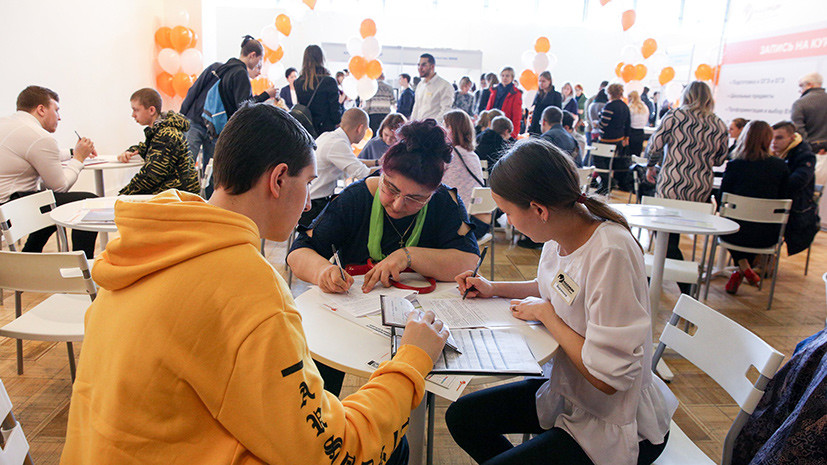In Russia (according to the data of the Federal State Statistics Service, which RT studied), there are fewer young people who do not study, do not work and do not acquire professional skills. This level reached a record low in 17 years. So, by the end of 2018, about 14 million Russians between the ages of 15 and 24 lived in Russia, of which a little more than 10.2% (1.4 million) did not study, did not work, and did not learn any professional skills.
It is worth noting that since 2001 this figure has decreased by more than 5 percentage points: then almost 16% of young Russians were not busy with work or study. It is important to note that at that time the number of young citizens was greater: by the end of 2001, about 24.2 million Russians from 15 to 24 years old lived in the country. That is, over the years, young people in Russia have decreased by about 10 million people.
According to experts, a partial decrease in the share of unemployed youth is associated with a decrease in its number. However, experts are also confident that over 17 years the approach of young people to themselves and their lives has changed significantly.
“Young people have become more responsible and more anxious about their future, therefore they prefer to form their human capital from the very beginning so that they can feel more confident in working life and in society as a whole. The fewer young people who are not involved in improving the quality of their human capital, the better for the country, ”said Alexander Shcherbakov, professor of the Department of Labor and Social Policy at the Institute of Public Administration and Management of the RANEPA, in an interview with RT.
Unaccounted for achievements
Experts also note that the statistics of Rosstat in this case may not be completely accurate, and the actual percentage of young people who do not work and do not study in fact is even less.
“They may be employed in the shadow economy — at work, like delivery men, stickers, freelancers, and the like.” So Rosstat may simply not receive this information, not take into account and not control it, ”suggested Alexander Shcherbakov.
- AGN "Moscow"
In addition, according to the vice-rector of the Academy of Labor and Social Relations, Alexander Safonov, these men do not include young men who serve in the army.
“Our youth was responsible in the past years, and now responsible,” Safonov said in an interview with RT.
Create working conditions
The importance of quality education cannot be overestimated, but experts unanimously recognize unemployment as the main reason for the "idleness" of young Russians. And the problem in this case lies in disparate requests from employers and from young specialists.
“There are young people who would like to get a job, but simply can’t. Nobody expects yesterday's students in the labor market with open arms. Today, only 70% of graduates can get a job in the first year after graduation. According to statistics from recruiting agencies, resumes without work experience are read less often, ”said State Duma deputy Viktor Zubarev to RT.
According to him, the share of enterprises that are ready to take such employees does not exceed 60%. These are mainly large retail chains and the banking sector, but they arrange yesterday's graduates, as a rule, at low positions, in departments with the highest turnover and offer relatively low salaries. Under such conditions, many refuse to work.
“Of course, the situation varies from region to region. More often, young people from villages and urban-type settlements are at risk, as well as those who have received low-quality education in an area where there is already an overabundance of personnel, ”the deputy added.
In his opinion, it is necessary to orient young people based on the needs of the Russian economy and the labor market.
“In the same industry, for example, there is a request for updating personnel. Almost half of the industries are ready to grow young specialists. And the salaries of representatives of the so-called working professions are increasingly exceeding the salaries of white-collar workers - office workers, ”said Zubarev.
New interests
It is noteworthy that in recent years, young Russians have become more responsible not only for their careers and training, but also for their health.
As RT previously said, the statistics of the Ministry of Health showed that over the past 17 years, the average age when adolescents have been involved in the use of alcohol, drugs and tobacco has increased by about 2-3 years.
According to experts, this is primarily due to the fact that young people have a fashion for good study, prestigious work and other personal victories. And bad habits are no longer as attractive as reaching the heights of life.

